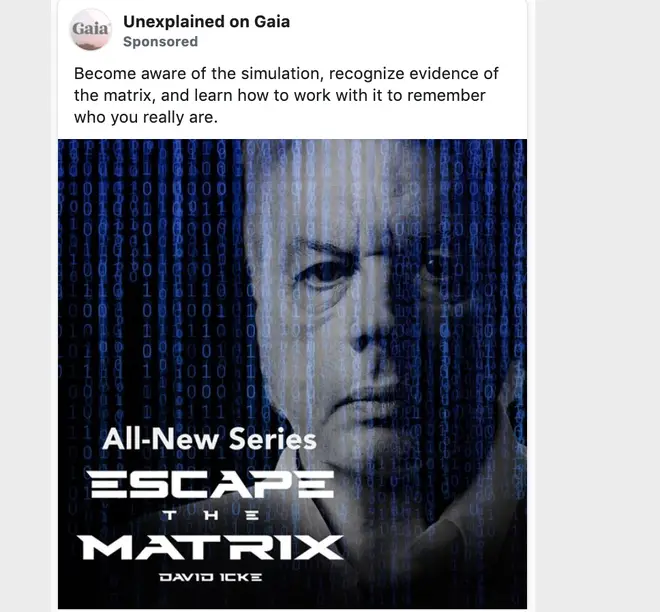
Simon Marks 4pm - 7pm
10 February 2021, 11:10 | Updated: 10 February 2021, 12:40

A streaming site that hosts extreme conspiracy theories about vaccines alongside virulent anti-Semitism is being publicised by tech giants such Amazon, Facebook and Google.
Gaia, a Netflix-style streaming service that bills itself as “empowering a global conscious community” through “originals, films and yoga to heighten your consciousness” is hosted by Amazon Prime.
But alongside the harmless yoga classes and videos about spiritual healing, it also contains hours of footage from known conspiracy theorists such as David Icke and Richie Allen – the man whose show Conservative MP Desmond Swayne just this week had to apologise for appearing on.

There are dozens of lengthy videos which contain multiple, sometimes dangerous conspiracy theories. In particular there is anti-vaccine disinformation that could actively hinder the acceptance of COVID-19 jabs, and a variety of anti-Semitic theories about how Jewish “Rothschild Zionists” control the world.
This content is available through subscription on Amazon Prime. And Gaia has placed thousands of pounds worth of adverts on Facebook and YouTube. Both social media companies claim to have banned COVID misinformation, but in fact are still making large sums from adverts which direct people to anti-vaccine content, and worse.
In a report last year, The Centre for Countering Digital Hate (CCDH) identified David Icke as the leading spreader of coronavirus misinformation online. Following the report’s release, Icke was banned from Facebook and YouTube. And yet he is still featured prominently in Gaia’s adverts on those very platforms.
Imran Ahmed, CEO of the CCDH said: “Our view is that a company that does business with anti-Semites or anti-vaxxers is a disgusting company, and should be known to be a disgusting company, and other companies should think twice before doing business with them.
"That is part of the problem with these enormous monopolies in the tech sector. Who else is there to do business with? And so that fundamental question is the most important one facing legislators in the UK and the US right now.”
The Facebook and YouTube adverts themselves do not contain any dangerous information, but as well as featuring David Icke, they are linking to Gaia, and thus indirectly sending people towards a variety of troubling content.
Gaia, Inc. itself is a sizeable and growing business, with 697,300 subscribers and revenues of $54 million (£39m) in 2019. Much of the content is dedicated to alternative healing and yoga, but a spectrum runs from there, through hours of documentaries about UFOs, 5G conspiracies, to the extreme content LBC and the CCDH have uncovered.
The service has been available through Amazon Prime since 2015, although it’s not clear exactly when some of the more extreme material appeared.
And there may soon be consequences for the Big Tech companies. Some time this year, the Government has promised to introduce an Online Harms Bill, which it says would task Ofcom with regulating online misinformation, and give it the power to levy fines of up to £18m, or 10% of global turnover.
Labour MP Clive Efford, who sits on the Commons Digital, Culture, Media and Sport Committee, said: “Big Tech companies can’t be trusted to regulate themselves, they’ve demonstrated that time and time again.
"What the Government has got to do is when it brings in the Online Harms Bill is introduce some very severe sanctions that are going to make these Big Tech firms sit up and listen.”
Former Education Secretary Damian Hinds, who now sits on the same committee, welcomed the Bill but said more action would be needed: “The Online Harms Bill is going to be world-leading legislation, but we are going to need to build on that over time. Ultimately I think we’re going to need a global approach, and global institutions to really tackle these things fully.
"We know how much these tech giants are capable of in designing systems, artificial intelligence, and finding clever new ways to sell to us. Let’s have that genius put to use in removing harmful material immediately.”
LBC approached Amazon to ask whether they felt, especially in the middle of a global pandemic, that it was suitable for them to be appearing to endorse such extreme content by association.
They declined to comment.
Facebook did not wish to comment, but are investigating the adverts brought to their attention by LBC.
Google, which owns YouTube also declined to provide us with a statement, but pointed to a change its advertising policy which will take effect next week, and which aims to prohibit content that contradicts the scientific consensus during major health emergencies.
Gaia itself could not be reached for comment.